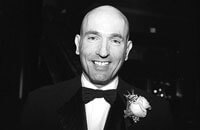Tom Healy takes reins on July 1 at Lower Manhattan Cultural Council
Healy, who has established himself in all aspects of performing, literary, and visual arts, replaces Liz Thompson, who left LMCC a few months ago. He will start July 1 and acting executive director Tricia Mire will become managing director.
“Tom brings a passion for contemporary art and community, as well as a solid background as an entrepreneur and strategic planner to LMCC.,” Cherrie Nanninga, the chair of the organization’s board, said in a prepared statement. “He enters as the organization is alive with activity and purpose, with an outstanding history of serving artists and the community.”
Healy, 42, received his bachelors degree from Harvard University and a masters in fine arts from Columbia University, where he most recently worked as a consultant on literary, visual and performing arts projects. His resumé includes ownership of an arts management consulting company that worked with the Metropolitan Museum, PBS, and the Institute of Contemporary Art in London. His contemporary art gallery, which he opened in 1994 in Chelsea and has since sold, showcased emerging international and American artists such as Tom Sachs and Venice Biennale winner Janet Cardiff. Healy currently holds numerous board positions in organizations including the List Center for Arts and Politics at the New School University and PEN America, the advocacy group for writers, and for the past five years he has been the chair of Creative Time, a Manhattan-based cultural organization which commissions public artwork.
“I am thrilled to take this job,” Healy said in a telephone interview. “I think it’s a great opportunity for me and I think it’s going to be a challenge.”
Healy will oversee all programs that the Lower Manhattan Cultural Council offers, including funding local artists and cultural organizations across Manhattan, staging arts performances such as the “River to River” music festival, and administering projects such as the artist residency program in the Woolworth Building. Before 9/11, the program was run out of the World Trade Center and an LMCC artist was killed in the attack.
Even though he won’t fill the director’s position for another month, Healy is already attempting to bring some of his ideas to fruition. He has spoken with PEN America about starting a literary festival, and has hopes for creating events that would showcase artists in theater and sculpture. More than anything, Healy’s goals point up his desire to keep the arts scene downtown likely even as the primary focus in Lower Manhattan remains on the efforts to rebuild the World Trade Center site. One of his particular concerns is the maintenance of affordable living, rehearsal, and performance space for artists as rents continue to climb and he sees LMCC as playing a critical role in preserving an artistic presence downtown as the physical and cultural landscape begins to change.
“It‘s a question of what’s LMCC’s role and how can we be effective politically and financially,” Healy said. “Billions of dollars will be spent downtown and we want to be sure that the arts are on the table for all those conversations. The challenge is to make ourselves smart and relevant—how do we make more opportunity for the arts?”
“The challenge is also making sure the artists and arts organizations can survive in the real estate market and finding a way the cultural fabric of downtown doesn’t lose the artists that are there or maybe create incentives for them to live and work in spaces in downtown,” he continued. “Time is not on our side in some of those issues. We want to be able to do what we can during the next decade, so artists don’t get priced out.”
Healy lives in Greenwich Village with his partner Fred Hochberg, who was recently appointed as the dean of New School University’s Robert J. Milano Graduate School of Management and Urban Policy. Hochberg, a strong supporter of Sen. John Kerry’s presidential campaign, was acting director of the Small Business Administration under Pres. Bill Clinton and has played a high profile role in gay politics both in New York and in Washington for many years.


































